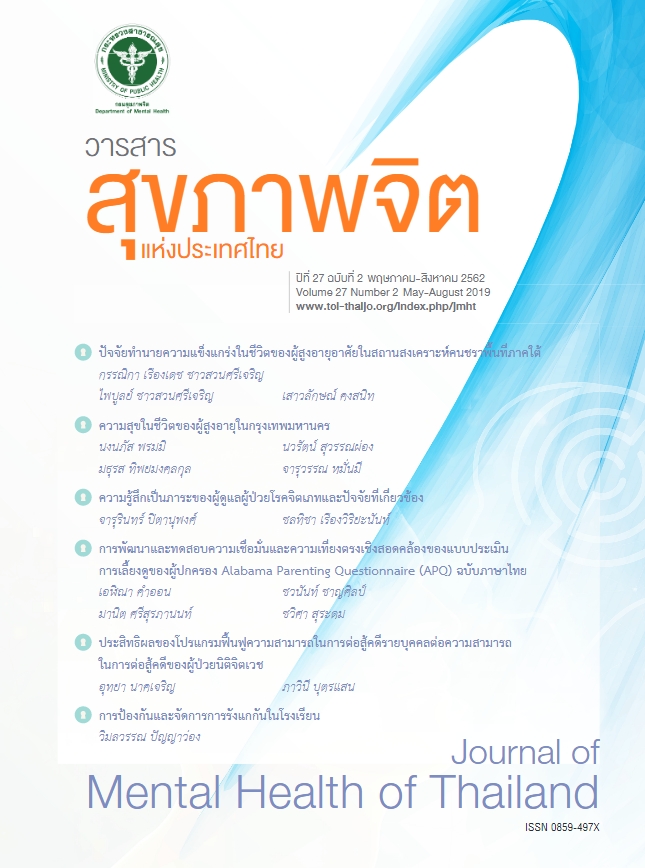การพัฒนาและทดสอบความเชื่อมั่นและความเที่ยงตรงเชิงสอดคล้องของแบบประเมินการเลี้ยงดูของผู้ปกครอง Alabama Parenting Questionnaire (APQ) ฉบับภาษาไทย
คำสำคัญ:
การเลี้ยงดู, แบบประเมิน, ปัญหาพฤติกรรมบทคัดย่อ
วัตถุประสงค์: เพื่อหาความเชื่อมั่นและความเที่ยงตรงของแบบประเมิน Alabama Parenting Questionnaire (APQ) ฉบับภาษาไทย
วิธีการ: เป็น tool development study ผู้วิจัยและคณะทำการแปลแบบประเมิน APQ ฉบับภาษาอังกฤษเป็นภาษาไทย และนำไปเก็บข้อมูลจากผู้ปกครองของเด็กที่มีช่วงอายุ 6-18 ปี ของโรงเรียนเอกชนแห่งหนึ่งในจังหวัดเชียงใหม่ จำนวน 200 คน ข้อมูลที่ได้นำมาหาความเชื่อมั่น ด้วยการหาค่า Cronbach’s alpha แยกตามหมวด และความเที่ยงตรงของแบบประเมิน ด้วยสถิติ Pearson’s correlation เปรียบเทียบแบบประเมิน APQ ฉบับภาษาไทยกับแบบประเมิน PHQ9 และ SDQ
ผล: การทดสอบหาความเที่ยงตรงด้านโครงสร้างของแบบประเมิน APQ ฉบับภาษาไทยเทียบกับแบบประเมิน PHQ9 และ SDQ พบว่ามีความสัมพันธ์กันอย่างมีนัยสำคัญ (p value<0.01) แสดงถึงความเที่ยงตรงด้านโครงสร้างในการประเมินการเลี้ยงดูของผู้ปกครอง ส่วนในการทดสอบหาความเชื่อมั่นพบว่าค่า Cronbach’s alpha ของ 4 หมวดหลักมากกว่า 0.7 แสดงถึงความสอดคล้องภายในสูง
สรุป: แบบประเมิน APQ ฉบับภาษาไทยมีค่าความเชื่อมั่นด้านความสอดคล้องภายในและค่าความเที่ยงตรงด้านโครงสร้างที่ยอมรับได้ เหมาะกับการนำมาใช้ประโยชน์ในการคัดกรองการเลี้ยงดูที่มีปัญหา
Downloads
เอกสารอ้างอิง
2. Frick PJ, Lahey BB, Loeber R, Stouthamer-Loeber M, Christ MA, Hanson K. Familial risk factors to oppositional defiant disorder and conduct disorder: Parental psychopathology and maternal parenting. J Consult Clin Psychol. 1992:60;49–55.
3. Costello EJ, Foley DL, Angold A. 10-year research update review: the epidemiology of child and adolescent psychiatric disorders: II. Developmental epidemiology. J Am Acad Child Adolesc Psychiatry. 2006:45;8-25.
4. Alonso García, Román Sanchez. Prácticas educativas familiaresy autoestima [Family parenting and self-esteem]. Psicothema. 2005:17;76-82. Spanish.
5. Madelyn S. Gould. Psychosocial risk factors of child and adolescent completed suicide. Arch Gen Psychiatry. 1996;53:1155-62.
6. ศุภรัตน์ เอกอัศวิน. ความชุกของโรคจิตเวชในนักเรียนไทย อายุ 13-17 ปี [The prevalence of psychiatric disorders in Thai students aged 13-17 year]. วารสารสุขภาพจิตแห่งประเทศไทย. 2559;24:141-53. Thai.
7. Lahey BB, Loeber R, Quay HC, Frick PJ, Grimm J. Oppositional defiant disorder and conduct disorder. Washington, DC: American Psychiatric Association DSM-IV Sourcebook; 1997.
8. Dadds MR. Families, children, and the development of dysfunction. 1st ed. New York: Sage; 1995.
9. Dishion TJ, Patterson GR, Stoolmiller M, Skinner M. Family, school, and behavioral antecedents to early adolescent involvement with antisocial peers. Developmental Psychology. 1991;27:172–80.
10. Prinz RJ, Jones TL. Conduct and 531 oppositional defiant disorders: Epidemiology, risk factors, and treatment. Family-based interventions. In C. A. Essau (Ed.). New Jersey:Lawrence Erlbaum Associates; 2003.
11. M. Christine Lovejoy, Patricia A. Graczyk, Elizabeth O’Hare, and George Neuman. Maternal depression and parenting behavior: A meta-analytic review. Clinical Psychology Review. 2000;20:561–92.
12. Sasha M. Zeedyk, Jan Blacher. In International Review of Research in Developmental Disabilities. 1st Edition. Tennessee:Academic Press; 2015.
13. Field T, Lang C, Martinez A, Yando R, Pickens J, Bendell D. Preschool follow-up of infants of dysphoric mothers. Journal of Clinical Child Psychology. 1996;25:272-9.
14. Canadian Paediatric society. Maternal depression and child development. Paediatrics Child Health. 2004;9:575-83.
15. Kochanska G, Kuczynski L, Radke-Yarrow M, Welsh JD. Resolutions of control episodes between well and affectively ill mothers and their young children. J Abnorm Child Psychol. 1987;15:441-56.
16. Andres Martin, Michael H. Bloch, Fred R. Volkmar. Lewis- A comprehensive textbook of child and adolescent psychiatry. 5th ed. Philadelphia:Wolters Kluwer; 2018.
17. Patterson G. R., Reid J. B., Dishion T. J. Antisocial boys. Eugene, OR: Castalia; 1992
18. Kristin duppong Hurley. Assessing parenting skills and attitude: A review of the psychometrics of parenting measures. Journal of Child and Family Studies. 2014;23:812-23.
19. Frick,P.J. Alabama parenting questionnaire. Journal of Clinical Child Psychology. 1996;25:317-29.
20. Jacob Cohen. Quantitative methods in psychology, A power primer psychological bulletin. 1992;112:155-9.
21. Lotrakul M, Sumrithe S, Saipanish R. Reliability and validity of the Thai version of the PHQ-9. BMC Psychiatry. 2008;8(46):1-7.
22. Kroenke K, Spitzer RL, Williams JBW. The PHQ-9. Validity of a brief depression severity measure. J Gen Intern Med. 2001;16:606-13.
23. ยงยุทธ วงศ์ภิรมย์ศานติ์, พรรณพิมล วิปุลากร, สุภาวดี นวลมณี, โวฟกัง เวิร์นเนอร์, อภิชัย มงคล. ค่าเกณฑ์เฉลี่ยและคุณสมบัติของเครื่องมือ: แบบประเมินจุดแข็งและจุดอ่อนฉบับภาษาไทย [Strengths and difficulties Questionnaire (SDQ) Thai improved version: change and administration]. วารสารสุขภาพจิตแห่งประเทศไทย. 2554;19:42-57. Thai.
24. World Health Organization. World Health Organization Disability Assessment Schedule (WHO DAS II): development psychometric testing and applications. Bulletin of the World Health Organization; 2010, In press.
25. มานิต ศรีสุรภานนท์. การเลือกใช้มาตรวัดสุขภาพ: ข้อควรพิจารณาเบื้องต้น [Selecting health measurement scales: basic issues for considerations]. เชียงใหม่เวชสาร. 2560;56:49-61. Thai.
26. สุคนธ์ทิพย์ บุญยัง, ปริทรรศ ศิลปะกิจ, อนุชาติ มาธนะสารวุฒิ. เครื่องมือประเมินภาวะซึมเศร้าด้วยรูปภาพ [Face Mood Pictorial Depression Assessment Tool]. วารสารวิชาการสาธารณสุข. 2558;24.845-53. Thai.
27. Robert Goodman et al. Using the Strengths and Difficulties Questionnaire (SDQ) to screen for child psychiatric disorders in a community sample. The British Journal of Psychiatry. 2000;177:534-9.
28. Wolfgang Woerner et al. Normative data and psychometric properties of the Thai version of the Strengths and Difficulties Questionnaire (SDQ). Journal of Mental Health of Thailand. 2011;19:42-57.
29. Abdallah Badahdah, Kien Trung Le. Parenting young Arab children: Psychometric properties of an adapted Arabic brief version of the Alabama parenting questionnaire. Child Psychiatry Hum Dev. 2016;47:486–93.
30. Cecilia A. Essau, Satoko Sasagawa, Paul J. Frick. Psychometric Properties of the Alabama parenting questionnaire. Journal of Child and Family Studies. 2006;15:597-616.
31. Shelton KK, Frick PJ, Wootton J. Assessment of parenting practices in families of elementary school-aged children. Journal of Clinical Child Psychology. 1996;25:317–29.
32. Dadds MR, Maujein A, Fraser J. Parenting and conduct problems in children: Australian data and psychometric properties of the Alabama parenting questionnaire. Australian Psychologist. 2003;38:238–41.
33. Elgar FJ, Waschbusch DA, Dadds MR, Sigvaldason N. Development and validation of a short form of the Alabama parenting questionnaire. J Child Fam Stud. 2007;16:243-59.
34. ไชยันต์ สกุลศรีประเสริฐ. การวิเคราะห์องค์ประกอบเชิงยืนยัน [Confirmatory factor analysis]. วารสารจิตวิทยาคลินิก. 2556;44:1-13. Thai.
ดาวน์โหลด
เผยแพร่แล้ว
รูปแบบการอ้างอิง
ฉบับ
ประเภทบทความ
สัญญาอนุญาต
- ผู้อ่านสามารถนำข้อความ ข้อมูล จากวารสารไปใช้ไปใช้ประโยชน์ทางวิชาการได้ เช่น เพื่อการสอน เพื่อการอ้างอิง แต่การนำไปใช้เพื่อวัตถุประสงค์อื่น เช่น เพื่อการค้า จะต้องได้รับอนุญาตเป็นลายลักษณ์อักษรจากกรมสุขภาพจิตก่อน
- ความคิดเห็น ข้อมูล และบทสรุปต่าง ๆ ที่ลงตีพิมพ์ในวารสารสุขภาพจิตแห่งประเทศไทยเป็นของผู้เขียนบทความและมิได้แสดงว่ากองบรรณาธิการหรือกรมสุขภาพจิตเห็นพ้องด้วย




